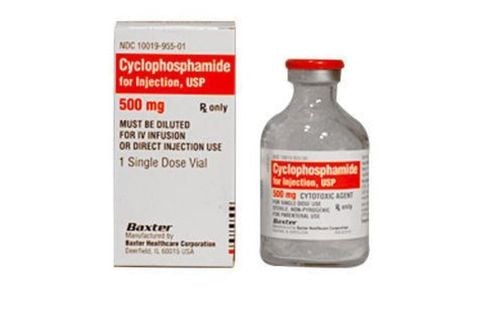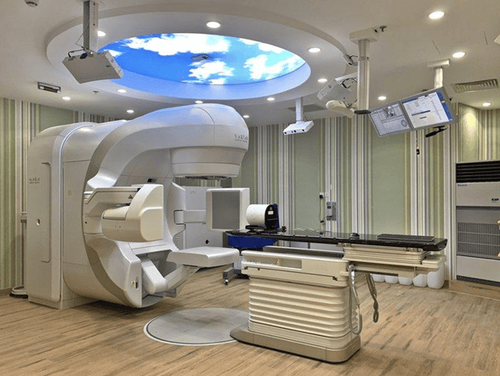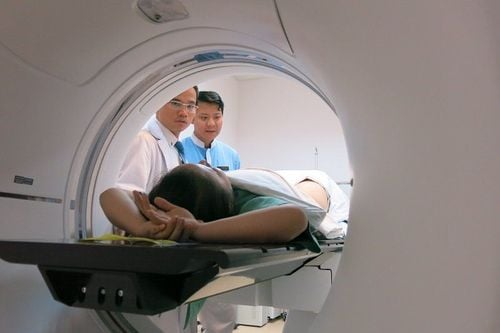This is an automatically translated article.
The article is professionally consulted by doctors working at Oncology Center - Vinmec Central Park International General HospitalSide effects from Radiation Therapy usually start out mild and can progress during treatment. Some side effects happen immediately, some of them happen soon after radiation treatment ends, and others can happen months or years later.
1. Side effects of radiation therapy
There are always some side effects; they are usually limited to the area of the body being treated and depend on the size of that area and the specific tissues involved. Many side effects are treatable. Not all of the side effects mentioned below are certain to occur and your radiation therapist will discuss them individually with you on an individual basis.
Side effects usually begin mildly and may progress over the course of treatment. Some side effects happen immediately, some of them happen soon after radiation treatment ends, and others can happen months or years later. You will be fully informed of all expected and other potential side effects at the time the consent form is signed.
Remember: your doctors, nurses, nursing staff and radiotherapy technicians are available to answer any questions you may have during radiation therapy.
Please notify any medical staff as soon as possible if you notice any changes in your person or normal habits, such as changes in diet, weight, habits sleep habits, increased discomfort or pain.
1.1 Early side effects (during and immediately after radiation) Nausea or vomiting Nausea and occasional vomiting can occur with this radiation therapy but can usually be well controlled with antiemetic tablets . Some patients feel nauseous for several hours after each treatment. You may find that treating on an empty stomach and avoiding food for 1-2 hours afterward can help reduce nausea.
Other tips that can help with nausea and vomiting include:
Eat several small meals throughout the day. Eat slowly. Avoid fried, spicy or fatty foods. Drink cool water between meals to avoid dehydration. Radiation therapy to the head can cause symptoms such as headaches, dizziness, and vision changes. It is essential that you notify your healthcare provider immediately if you have such symptoms, or if they increase in severity. Your doctor will likely prescribe medication (pain relievers or steroids) to help relieve those symptoms. Steroid pills can also have side effects, but we do our best to minimize the dose and duration of your treatment.

Buồn nôn và thỉnh thoảng nôn có thể xảy ra với phương pháp xạ trị
Ear problems You may find that your hearing is affected by treatment. This may be due to swelling in the ear from treatment and only occurs if part of the ear is in the treatment area. However, it is a temporary effect, which may go away a few months after treatment.
The inside of the ear may also itch. It and can dry out a bit. This is a normal reaction. It Your ears will settle down in three or four weeks, after the treatment is over.
Effects on memory You may experience effects on temporary memory. In many cases you will be back to normal but during radiation this can be frustrating. Our radiation nurses and technicians will advise you if you need help and advice if this happens.
During radiation therapy, we recommend washing your hair gently and but infrequently. Use a very mild shampoo (as recommended by therapists/radiologists). You should avoid all heat devices such as hair dryers, straighteners or curling irons.
If you would like more information about wearing a wig or headscarf, please ask one of the possible radiotherapy technicians or nurses to arrange for you to see a member of the Radiation Therapy Team.
Skin irritation Skin reactions are a common side effect of radiation therapy. This happens because the radiation has to go through the skin to reach the part of your body that needs to be treated. Only the skin in the treatment area will be affected, and this usually happens from the 2nd week of treatment until the 4th week after you finish radiation therapy. The type of reaction that is likely to be seen is redness of the skin around the treated area. Your skin may become sore and itchy and there may even be blisters in the areas where the radiation was given.
The severity of the skin reaction will vary from person to person and there are different creams, gels and dressings available to treat if needed. There are also measures you can take to keep your skin in good condition to help you get through radiation therapy well.
Remember: a skin reaction will only affect the part of your body being treated, so just follow the "Do's" and "Don'ts" instructions for the part of your body being treated. your treatment in question (head, face, neck, breast, abdomen, pelvis, ...).
Should
Wash your hands but only use simple soap, the kind of soap that does not smell. The area should be gently washed and dried with a soft clean towel.; Use a very mild shampoo to wash your hair; Use warm water to wash;. Use a moisturizer twice a day from the start of treatment. Increase the amount used if necessary.; Try to keep fresh air to the affected area to be treated as this will greatly aid the healing process.; Be sure to notify the Radiation Team if the treatment area is causing pain or discomfort. We will be able to provide you with different creams, gels, bandages or pain relievers if needed. Don't
Do not use scented soaps or shower gels. These can make your skin more sore.; Do not use any creams, powders, lotions or home remedies on the skin in the treated area unless we advise you to do so.; Do not scratch the skin being treated; Do not bathe in chlorinated water, especially in chlorinated pools during radiation therapy and after treatment (3-4 weeks) until your skin is fully recovered.; Do not use perfume or shaving cream on your scalp. Try spraying it on your clothes instead. Do not use hot appliances such as hair dryers, straighteners, rollers, or curling irons. Skin that has been exposed to radiation therapy may be more sensitive to the sun than it was in the past. You can go out in the sun, but make sure you use SPF 50 or higher on the treated area. Also, try to wear a hat when going out in the sun.
Fatigue You may feel more tired than usual during radiation therapy. It's important that you get enough sleep and rest, but there's no reason to drastically change your lifestyle.
The fatigue you will feel during radiation therapy is not the same type of fatigue as after you overwork it.
You can become fatigued during radiation treatment because of a combination of factors, including:
The effect of radiation on your body The need to adhere to a daily treatment routine Emotional changes since you received your diagnosis Prolonged physical effects from chemotherapy or surgery Changes in diet and lifestyle because of treatment interruptions

Bệnh nhân có thể cảm thấy mệt mỏi hơn bình thường trong quá trình xạ trị
How to combat fatigue during radiation therapy?
Listen to your body. You will feel tired now and then during your radiation treatment. If you accept and expect to know that it will happen, you will be better able to deal with it when it does happen
Re-establish a sensible routine. You will minimize fatigue-related stress if your daily routine is realistic and organized.
Try to exercise. A little bit of reasonable exercise will give you more energy. Try to establish a regular walking routine.
Rest more. Many patients find that resting such as a brief nap during the day can give them more energy. Be frugal and only spend your energy on only the most important activities of the day.
Ask for help. When you're being treated for any serious illness, this is a good time to ask for help at home and at work.
1.2 Late side effects (months to years after radiation) These are the most difficult late effects to predict, depending on your location, condition, lifestyle, etc. The chances of these are small and while they are rarely serious, they can be long-term.
They depend on the area of the body being treated and many other factors, so the rest of this section guide will only apply to certain patients.
Pituitary gland: Your pituitary gland produces hormones that regulate growth and metabolism in the body. During radiation therapy to the brain area, the pituitary gland can be affected and become underactive for many years after radiation therapy to the brain area. However, the condition is treatable with medication.
Optic nerve (eye): In some cases it may be necessary to treat the optic nerve. If this is required, then your doctor will individually explain to you any expected side effects on an individual basis.
Development of Cataract: This can happen due to unavoidable radiation to the eye. Currently, cataracts can be treated with surgery to replace the lens.
Hearing loss: You may experience hearing loss in one or both ears, usually for some time after radiation treatment is over. This usually happens gradually.
Skin: You may develop some areas of thick and hard skin, of the skin and soft tissues of the neck.
Rare long-term side effects: There is very little risk of developing a secondary cancer, often many years after receiving radiation therapy. This risk is much smaller than the benefit of radiation therapy in your current cancer treatment.
During your follow-up care, we will consider all of these issues. Please feel free to talk to us about any of your concerns when you arrive at your next appointments.
Your feelings
After your cancer diagnosis and treatment, you will have a very complex set of feelings including anger, anxiety, fear and sadness. These are all normal reactions that many patients experience. Everyone has their own way of adapting. Some people find it helpful to talk to others who have been through similar experiences themselves. Some patients prefer to keep their emotional feelings to themselves without sharing.
There is no way to cope, but help is always available if you need it. Please talk to any member of the treatment team about getting support if you feel it helps.
2. Who should you meet?

Bệnh nhân có thể hỏi tất cả những vấn đề liên quan đến xạ trị làm mình lo lắng
Your consultant is a radiation therapist who will decide the type and amount of treatment you will receive. In general, the radiation therapist is the primary person responsible for all of your radiation therapy, so you can ask all the radiation-related questions that concern you.
Radiotherapy technicians Radiation therapy technicians are professionals trained to give you radiation treatment and operate the machines used to treat you. They are fully involved in your treatment from helping with immediate treatment planning to monitoring all aspects of your daily treatment. They work closely with doctors and other staff in the department. Since they see you every day while you are in treatment, they can answer any questions you have regarding any aspect of your radiation treatment, they will either recommend refer you to another specialist in the area of expertise you need to ask.
Clinical dietitian A clinical dietitian is a registered dietitian in clinical practice who has undergone extensive additional education relevant to the specialty area of practice. their. Clinical nutritionists provide support to patients and their families during treatment and after discharge if needed. They are fully informed about the treatment, possible side effects, and any other problems or problems that may arise.
If you would like to see a clinical dietitian, talk to a member of your medical or nursing team to arrange this.
Radiation nurses These are nurses specially trained in caring for people with cancer. You will see one of them when you first go to the treatment center and then you will see them on a regular basis during your radiation treatment. They are available throughout the working day if you have any concerns
Physical engineers and radiation therapy planners These people are highly trained science professionals for the operation radiotherapy planning. They help doctors decide the best way to plan the radiation therapy you need.
Physiotherapists These are professionals with experience in the evaluation and treatment of a wide range of physical problems that patients may have as a result of cancer or during radiation therapy. The aim of the physiotherapist working in cancer care is to maximize a patient's ability and function and improve their sense of well-being. One of the medical team members can refer you to them for advice and support.
Palliative care or symptom control team During treatment, some patients may see our Palliative Care or Symptom Control Team. Doctors (Consulting or Registering) and specialist nurses are experts in the management of cancer-related symptoms and also their treatment.
Psychological counseling service The emotional impact of cancer diagnosis and treatment is very difficult. It is very normal for you to feel stressed, anxious, sad, angry or out of control. Each person controls and processes their emotions differently. Some people find strength within and draw support and comfort from friends and family, others may need extra help from the outside. Our multidisciplinary team of professionals plays an important role in helping you deal with your emotions, but sometimes you may feel you need extra help from a psychologist.
Psychologists with extensive specialist training in psychotherapies help people and families who are particularly distressed, anxious, or feeling very low. You can choose to see a psychologist for a counseling session or you can take relaxation classes.
Speech therapy You may have trouble talking. Speech therapists are experts in dealing with these types of problems. Please ask any member of your medical team for more information or ask your doctor for a referral to a speech therapist.
In lieu of closing We hope this document provides you with the most basic and common understandings that will help you understand and feel secure in planning your treatment with us and during your radiation therapy. for you. All comments and feedback are welcome to be heard and acknowledged to edit and supplement this document in order to bring the best benefits to the healthcare community and to you, our beloved patients. we.
Oncology Center - Vinmec Central Park International General Hospital is modernly built according to international standards, using a multi-specialist approach model in diagnosis and selection of appropriate treatment regimens for each patient. contribute to comprehensive patient care. Vinmec Central Park Cancer Center has outstanding advantages in cancer treatment such as:
Vinmec Convergence of experts who are good at radiation therapy, chemotherapy and surgery, equipped with modern facilities. The most modern radiotherapy planning system and Truebeam in Southeast Asia, with the outstanding advantage of minimizing the effects of radiation on benign tissues compared to X-rays, reducing irradiation time and the risk of adverse effects. side effects for patients.) effective treatment of common cancers: Lung, Head, neck, breast.... As the first hospital in Ho Chi Minh City to apply autologous immunotherapy, Vinmec Hospital Central Park can treat cancer with multimodal cancer treatment regimens suitable for each case, bringing high treatment efficiency, providing one more reliable cancer examination and treatment address for people. To learn more about radiation therapy for cancer treatment at Vinmec, you can contact HOTLINE: 0938 506 009 or register online. online HERE.
MORE:
What is radiation therapy? The role of radiation therapy How does radiation therapy work? Information handbook to support patients receiving radiation therapy to the head and neck area













